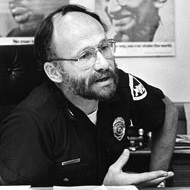
“Kindness and authority are not mutually exclusive; neither are kindness and effectiveness.”
The old adage calls for “random acts of kindness.” On May 1st, I wrote about the role of kindness in policing. In part, I said:
“Is not kindness in our tool kit? Let’s think about this. What would it be like if police in America were noted for being kind; to be seen as friendly, generous, and considerate to all others regardless of their station in life?”
Thinking more about this with regard to policing — kindness and authority are not mutually exclusive; neither are kindness and effectiveness. Somehow, in many ranks of our nation’s police, kindness is seen as weak and those who practice it as ineffective or even “wimps.”
Over the years, I have learned that being kind does not undermine my authority in the community, but rather enhances it. When I try to act with kindness in maintaining the peace and enforcing our laws, I have better outcomes and it aligns with why I took this job in the first place — to help and serve others — “to do justice, love kindness, and walk humbly.”
It is only when fear and uncertainty drives our daily work that kindness becomes foreign to us. When we think we have to be always in control kindness evades us and we become someone we do not want to be and unhappiness quickly follows in its stead.
I suggest we re-visit the practice of being kind: the quality of being friendly, generous, and considerate and think not about its practice “randomly,” but rather “intentionally” in order to achieve two important personal goals:
It is the practice of kindness that builds the kind of relationships we need to develop between police and community members.
Kindness builds trust. And when citizens come to trust police I can assure you that the job of policing that community becomes not only easier, but self-fulfilling and self-actualizing.
Robert Greenleaf put together the teachings of the enduring religions of the world when he described Servant Leadership:
“The servant-leader is servant first . . . That person is sharply different from one who is leader first.”
Do you see yourself as first leading or first serving? Servant Leadership is to first have a focus on others — not oneself. It goes against many of our notions about leaders and leadership. It is that focus on others that makes a true leader.
Two things can come out of one’s leadership — because of that leaders must ask themselves these three questions from Greenleaf about how they are acting as a leader (and that goes for rank and file police officers as well):
In fact, when we combine the practice of Procedural Justice with developing our Emotional Intelligence we will find that kindness becomes quite easy and those whom we contact in our work will be more likely to treat us in the same manner.
The nature of police work gives its practitioners hundreds of opportunities each day to be kind, to help, to advise, to wisely caution. It should not be done randomly, but intentionally! Try it and see!
And you might consider adding a new category to your daily report: “intentional acts of kindness” and set a daily quota for yourself!
P.S. Also, an effective 21st century police agency uses social media to highlight it’s officers’ many intentional acts of kindness and to emphasize that acts of kindness far more frequently occur than uses of force (and have the data to prove it)!
This post was originally published May 21, 2018 at David C. Couper’s blog Improving Police.